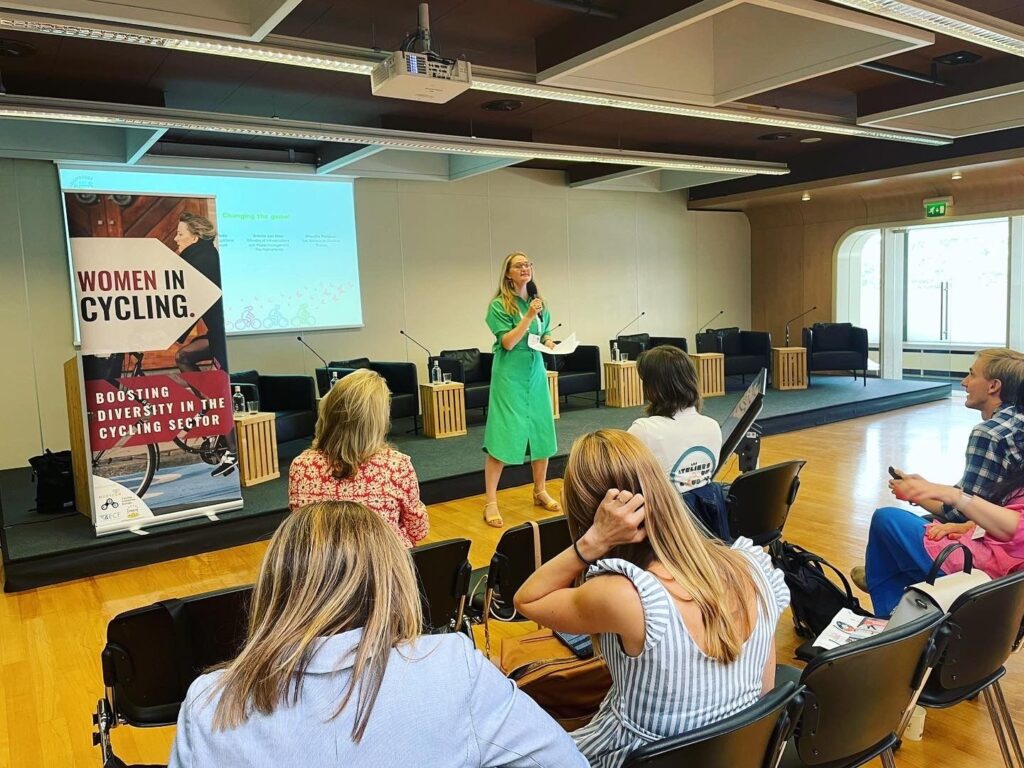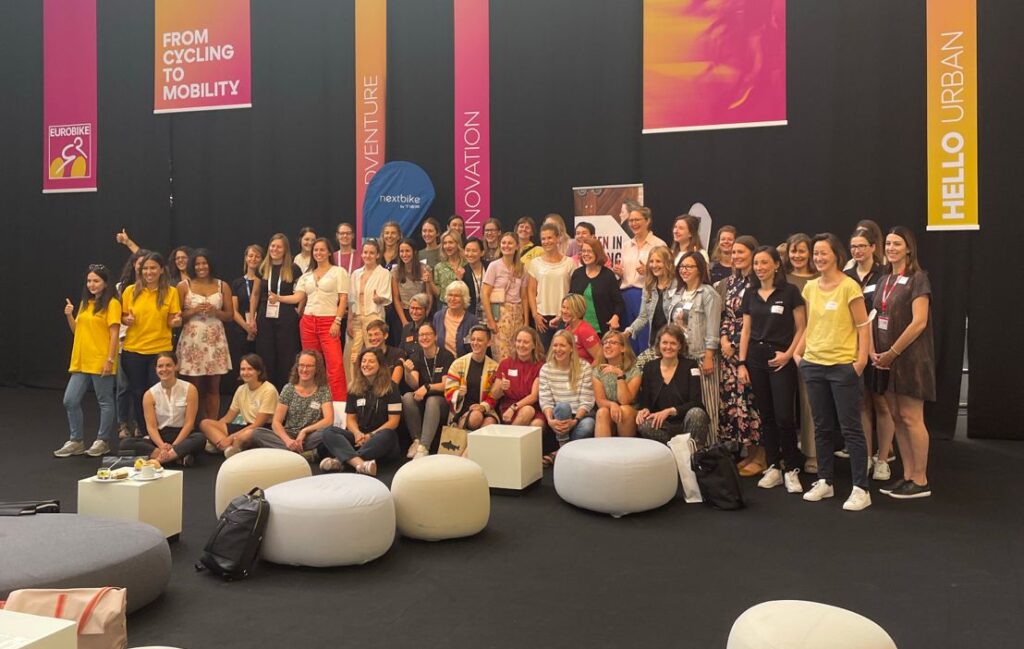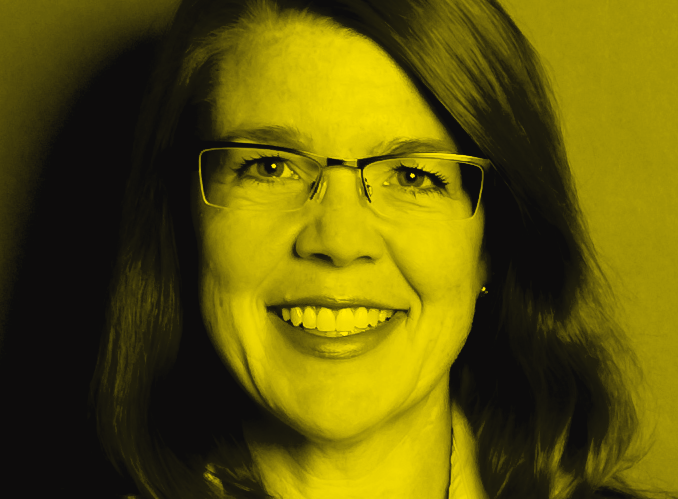9 min. read
Jill Warren is the CEO of the European Cyclists’ Federation (ECF) based in Brussels. They are a member-based organisation, in Europe and beyond, dedicated to promoting cycling as a sustainable and healthy means of transport and leisure. ECF is a founding member of the Women In Cycling Network, about which Jill speaks in this exchange.
—
Could you talk about your personal road into cycling?
I had the good fortune to live in Freiburg, Germany, starting when I was a graduate student, where the modal share of cycling is really high, and the infrastructure is pretty good. I went everywhere by bike there. Also I’ve been on some amazing cycling holidays over the years, so I really love to explore the world by bike. I’m passionate about everyday cycling as a means of transport, as well as about cycling as a great way to explore the world, and I bring this passion into my work at ECF.
Could you speak to me a little bit about how ECF – in the work that you’re doing – prioritises the needs of vulnerable demographics such as women?
It starts with your own organisation. So, within ECF, we strive for gender balance and inclusion more broadly. For one thing, we’ve successfully increased the representation of women at all levels of the organisation, particularly with the senior levels since I joined in early 2020, and we have subscribed to a no “manel” (all male panel) policy for our events and events that we speak at externally because we don’t want to encourage a lot of what we were seeing before – and still see to some extent – at events where you only hear the male voice.
More generally, we believe that cycling should be made accessible to all ages, abilities, backgrounds, and diverse identities. Cycling really is for everyone. The policy work that we support is designed to grow cycling to be very inclusive of all kinds of people, whether it’s gender balance or any other factor.

ECF runs the Women In Cycling (WIC) Network. Could you speak to me a little bit about the intentions behind that project and about the progress that it is making currently?
My understanding was that it emerged from a discussion at the Velo-city conference in 2019 – before my time as CEO – but apparently in one of the sessions where the speakers and the audience were very heavily male, someone stood up and said, “Where are all the women here?” and that prompted a discussion on how we can encourage greater participation of women in the cycling sector in the broadest sense: in advocacy, policy-making, planning, industry, and so on. Some of these players came together to discuss that further and, for us, believing that greater gender equality is key to unlocking the full potential of cycling, and in line with our mission, we wanted to be a founding member of this burgeoning initiative.
So after lots of discussion, and a bit of research about what we should do and and who we should do it for, we launched an online event in February 2021 that was attended by over 500 participants together with the other founding members; Cycling Industries Europe, Velokonzept, Mobycon and CONEBI.
With the network, we aim to help women in cycling get more visibility, help them deliver more impact, and help them get more leading roles in the sector in the broadest sense. More specifically how I would describe that is that we want to create an empowering platform for women with opportunities to network, exchange views and experiences, have that visibility, collaborate on projects and encourage organisations across the sector to adopt targets. It can start with something like our no all-male panel policy, for example; that’s something simple I think all organisations can do. We want them to also have other goals and policies that would improve the diversity and gender balance that they have, and increase the representation in leadership roles in particular, because that’s where we see a big problem.
We want to ensure that the diverse experience of women is taken into account; in decision-making bodies and projects and processes that affect cycling and the sector more broadly. When planning infrastructure, you have to take the needs of women into account. Most transport systems are planned for the average male commuter, not realising that women are more likely to take multi-stop trips to drop off children and other such tasks. It’s not that men don’t do these things of course, but women do them at a much higher rate, and that’s not always taken into account in how transport is planned and who it caters to.
We spotlight women by providing networking, speaking, mentoring, and training opportunities. We concentrate these activities at places where there’s a lot of people generally, and a lot of women, like Velo-city, Eurobike, and other large events.
We are seeing more initiatives that support non-cis male demographics throughout cycling, including the BYCS and EIT collaborative TandEM programme, training women cycling trainers. How does the WIC Network approach the syncing of these different initiatives, moving towards a shared community of practice globally?
It’s vital to make sure that women can find like-minded women and be connected with those that have the same interests or are pursuing the same kinds of activities and goals. We have an expertise portal to which people can sign themselves up – this is publicly available, so anybody could consult the expertise portal and find women speakers or candidates for their events.
Beyond this is we have a LinkedIn group which is a closed, safe space where women can share things with each other; whether it’s, ‘Hey, I’m looking for an amazing person for this job opportunity’, or ‘I’m looking for a speaker’ or ‘I want to tell you all about this event’, and that’s how they can more directly communicate with each other.
Even more public facing is the program of ambassadors. 25 women were asked if they wanted to step up and take the position of role model or mentor, having an even more visible approach in the group, so that if we need a moderator for one of our events then that would be the first group we would turn to.
If ECF is invited to speak at a conference, are you able to take a proactive approach in advance of your involvement, perhaps nudging panel curation in a more inclusive direction through exposing them to the WIC network?
Certainly, Velo-city, ECF’s flagship event, is a good example. We have over 300 speakers across the four days of all on the different plenaries and parallel sessions, and sometimes some of these sessions will be organised by other groups under the Velo-city umbrella, but if we see that they’ve put together a panel with only men on it, we say ‘sorry, you can’t do that’. On the whole we strive for a 50/50 balance across all speakers in the program. I think setting an example like that is really helpful because it encourages others to do the same and I think it does send a signal out there and we can certainly point to the fact that we have this as a policy and that we encourage others through WIC to adopt it as well.
You mentioned that industry events are less balanced than advocacy ones. At Velo-city do you see the more diverse programming policy also reflected in your audience?
Yes. I think the problem is probably most noticeable in industry, and it’s a bit better at the city-official level. It’s sometimes not so great at the politician level – there tends to be many more males – and so it kind of depends what part of the sector that you’re looking at.

Speaking of the challenges in different sectors, could you speak on what your intentions for the initiative are in the next five years?
We certainly cooperate broadly in many sectors. WIC has a membership in the European Commission’s Women in Transport initiative, so we participate in that working group. We connect to other Women in Transport-type initiatives to make sure that we’re all talking to each other, sharing good ideas, and feeding into each other’s work. We want to continue to be this structured community of women in the sector and in this platform to encourage visibility and also to counteract the prevailing thought out there of, ‘Well I’d like to have more women in my organisation or more senior women but I just don’t know where to find them’. We’re saying, ‘Voila! Here they are’.
I think that will continue to be necessary and we’ll continue to do that, and just want to continue to be that support network for women in that sense. We select a theme every year and this year’s theme was very focused on recruitment. At one of our events we had a recruiter who’s very specialised in helping to hire diverse teams to talk to us about both: how do you get more diversity in your own organisations; and what’s going on in the wider market in terms of how companies are approaching that. It was incredibly informative.
As soon as you have people in decision-making positions, bigger shifts start to happen in organisations and in society. Are there any key figures that you look to in cycling and citymaking spaces that stand out as someone to inspire women and everyone looking to make this kind of change?
One of my favourite people who’s involved in the group who I think is just a fantastic role model in so many ways is Elke Van den Brandt who is a governmental minister in the Brussels region for mobility, public works and road safety. She’s great. She has spoken at a couple of our events and we participated in an event with her and Deputy Prime Minister Georges Gilkinet, whose office reached out to WIC as a group to participate in Brussels Mobility Week.
Are there any final points that you would like to add about WIC or towards the goal of increasing gender representation in cycling?
I wouldn’t claim credit for this by WIC in particular, but something that really struck me is when I look at our largest member organisations. Fietsersbond in the Netherlands, ADFC in Germany, and Cycling UK. Fietsersbond has previously had a woman CEO, when she resigned they hired another woman CEO, but for a long time, Fietsersbond was really the only bigger organisation to do so. Now, we also see a woman CEO at Germany’s ADFC, and at Cycling UK. Seeing more of this gender diversity in these advocacy organisations really, I think, changes the balance of topics that they focus on and issues that they find important. It’s such a breath of fresh air.
All Images: Velo-City

